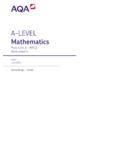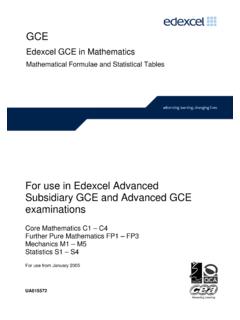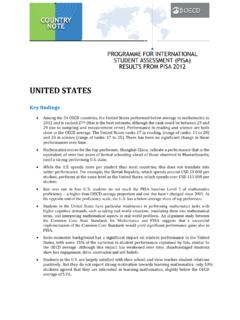Transcription of Advanced Problems in Core Mathematics
1 Advanced ProblemsinCore MathematicsStephen SiklosFourth edition, October 2008 Advanced Problems in core Mathematics : first draft2 ABOUT THIS BOOKLETThis booklet is intended to help you to prepare for STEP examinations. It should also be useful aspreparation for any undergraduate Mathematics course, even if you do not plan to take questions are all based on recent STEP questions. I chosethe questions either because they are nice in the sense that you should get a lot of pleasure fromtackling them or because I felt Ihad something interesting to say about them. In this booklet, I have restricted myself (reluctantly)to the syllabus for Papers I and II, which is the A-level core ( C1 to C4) with a few material should be familiar to you if you are taking the International Baccalaureate, ScottishAdvanced Highers or other similar first two questions (the sample worked questions) are in a stream of consciousness are intended to give you an idea how a trained mathematician would think when tacklingthem.
2 This approach is much too long-winded to sustain, but it should help you to see what sort ofquestions you should be asking yourself as you work through the later have given each of the subsequent questions a difficulty rating ranging from ( ) to ( ). Aquestion labelled ( ) might be found on STEP I; a question labelled ( ) might be found on STEPII; a question labelled ( ) might be found on STEP III. But difficulty in Mathematics is inthe eyeof the beholder: you might find a question difficult simply because you overlooked some key step,which on another day you would not have hesitated over. You should not therefore be discouraged ifyou are stuck on a one-star question; though you should probably be encouraged if you get throughthree-star questions without question is followed by a comment and a full solution.
3 The comment will contain hints and/ordirect your attention to key points; or it might put the question in its true mathematical solution should give sufficient working for you to read it through and pick up the gist of themethod. It is of course just one way of producing the requiredresult: there may be many otherequally good or better are not required for any of the Problems in this booklet; and calculators are not permittedin STEP examinations. In the early days of STEP, calculatorswere permitted but they were notrequired for any question. It was found that candidates who tried to use calculators sometimesended up missing the point of the question or getting a silly answer. My advice is to remove thebattery so that you are not hope that you will use the comments and solutions as springboards rather than feather beds.
4 Youwill only really benefit from this booklet if you have a good goat each question before looking atthe comment and another good go before looking at the solution. You should gain by reading botheven if you have completed the question on your you find errors or have suggestions for ways in which this booklet can be improved, please e-mailme: I update it hope you enjoy using this booklet as much as I have enjoyed putting it Problems in core Mathematics : first draft3 STEP MATHEMATICSWhat is STEP?STEP (Sixth Term Examination Paper) is an examination used by Cambridge colleges as the basisfor conditional offers. There were STEPs in many subjects butafter 2001 the Mathematics papersonly remain. They are used not just by Cambridge, but also by Warwick, and many other universitymathematics departments recommend that their appicants practise on the past papers even if theydo not take the examination.
5 In 2008, 2100 scripts were marked, only about 750 of which werewritten by Cambridge are three STEPs, called papers I, II and III. Papers I and II are based the core A-level syllabus,with some minor additions, and Paper III is based on a typical further Mathematics mathematicssyllabus (for which there is no recognised core ). The questions on Papers II and III are supposedto be of about the same difficulty, and are harder than those on Paper I. Each paper has thirteenquestions, including three on mechanics and two on probability/statistics. Candidates are assessedon six questions is the purpose of STEP?From the point of view of admissions to a university Mathematics course, STEP has three , it acts as a hurdle: success in STEP is thought to be a good indicator of potential to do well on adifficult course.
6 Second, it acts as preparation for the course, because the style of Mathematics foundin STEP questions is similar to that of undergraduate Mathematics . Thirdly, it tests motivation. Itis important to prepare for STEP (by working through old papers, for example), which can requireconsiderable dedication. Those who are not willing to make the effort are unlikely to thrive on adifficult Mathematics tests mathematical knowledge and technique by asking you to tackle fairly stereotypedproblems. STEP asks you to apply the same knowledge and technique to Problems that are, ideally,unfamiliar. Here is a quotation from Roger Porkess1which illustrates why A-level examinationsdo not test satisfactorily the skills required to tackle university Mathematics courses at the highestlevels:Students following modular syllabuses work much harder andthe system rewards them for doingso.
7 This means that there is a new sort of A C grade student: not necessarily a particularlyintuitive mathematician but someone who has shown the ability to learn the subject successfullyby dint of hard work and, quite possibly, good one believes that modular A- levels are uniformly bad; anything that encourages more studentsto study Mathematics must be basically good. However, they are not good preparation for thestudents who plan to take a degree in Mathematics from one of the top cloud has a silver lining: Roger Porkess (1995). Advanced Problems in core Mathematics : first draft4 Here is an A-level question:By using the substitutionu= 2x 1, or otherwise, findZ2x(2x 1) is a STEP question, which requires both competence in basic mathematical techniques andmathematical intuition.
8 Note that help is given for the firstintegral, so that everyone starts at thesame level. Then, for the second integral, candidates have to show that they understand why thesubstitution used in the first part worked, and how it can be the substitutionx= 2 cos to evaluate the integralZ23/2 x 13 x that, fora < b,Zqp x ab x 12dx=(b a)( + 3 3 6)12,wherep= (3a+b)/4 andq= (a+b) differences between STEP and A-level are:1. There is considerable choice on STEP papers (6 out of 13). This is partly to allow for differentA-level STEP questions are much longer. Candidates completing four questions in three hours willalmost certainly get a grade STEP questions are much less STEP questions may require considerable dexterity in performing mathematical Individual STEP questions may require knowledge of different areas of Mathematics (especiallythe mechanics and statistics questions, which will often require Advanced pure mathematicaltechniques).
9 6. The marks available for each part of the question are not disclosed on the Calculators are not Advanced Extension AwardAdvanced Extension Awards were taken for the first time in 2002. The last papers, in all subjectsexcept Mathematics , will be sat in 2010. Mathematics has a reprieve for at least a few years. TheAEA is not a replacement for STEP. It is aimed at the top 10% or so of the A-level cohort; atthe top 7000 or soi whereas STEP is aimed at the top 2000 or so. This difference matters, becausein Mathematics (though not perhaps in other subjects) it is important to match the difficulty of theAdvanced Problems in core Mathematics : first draft5question and the ability of the candidates AEA contains questions on only the coreA-level syllabus: no statistics and (more important for us)no mechanics.
10 Many of my colleaguesbelieve that, apart from the resulting reduction of choice,this is undesirable because it sends outthe wrong signals about the importance of these other areas of STEPSTEP is produced under the auspices of the Cambridge Assessment examining board. The settingprocedure starts 18 months before the date of the examination, when the three examiners (one foreach paper, from schools or universities) are asked to produce a draft paper. The first drafts arethen vetted by the STEP coordinator, who tries to enforce uniformity of difficulty, checks suitabilityof material and style and tries to reduce overlap between thepapers. Examiners then produce asecond draft, based on the coordinator s suggestions and taking into account his/her second drafts are circulated to the three moderators (normally school teachers), and to theother examiners, who produce written comments and discuss the drafts in a two-day meeting.





